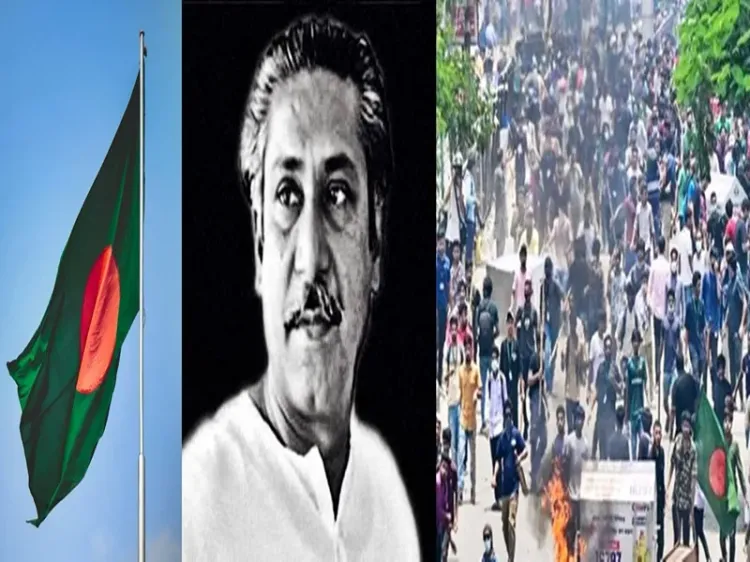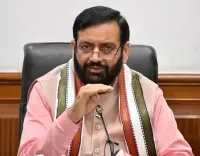Bangladesh at a Pivotal Moment: The Fight for Historical Consciousness and National Identity (IANS Analysis)

New Delhi, Dec 16 (NationPress) Five months after the collapse of Sheikh Hasina's government, Bangladesh is ensnared in a chaotic environment characterized by lawlessness, political strife, and escalating societal rifts. The newly formed interim government is grappling with the challenge of restoring order and implementing essential reforms, yet it appears incapable of steering the nation toward political harmony. Bangladesh's political transformation, however, has historical precedents.
Throughout history, student-led movements have been pivotal in driving the nation's changes, from the 1952 Language Movement to the 1971 Liberation War, the 1987 anti-Ershad movement, the anti-authoritarian struggles of the 1990s, and the recent July 2023 protests that ended Sheikh Hasina's 15-year reign.
What distinguishes Bangladesh from its neighbors is not only its historical experiences but also its fight for national identity. In contrast to Pakistan, which was formed largely on religious lines, Bangladesh arose from a struggle for linguistic and cultural self-determination.
This unique history of national formation is deeply intertwined with the challenges faced by its citizens. In this regard, historical memory is essential for understanding the political dynamics and values that influenced Bangladesh's independence.
However, since the 1971 Liberation War, religious and linguistic identities have frequently clashed, dominating debates on nationalism.
The July 2023 student demonstrations, led by Students Against Discrimination (SAD), showcased the youth's aspiration for a more equitable and inclusive society. Initially ignited by opposition to a controversial quota system—specifically the 30% reservation for descendants of freedom fighters in government jobs—the protests evolved into a broader critique of the Hasina administration's policies, perceived as favoring loyalists and perpetuating corruption.
The reinstatement of this contentious quota system by a court seen as sympathetic to Hasina came at a time of escalating economic challenges, including rising youth unemployment and inflation.
This ruling served as a catalyst for the youth's disillusionment, ultimately leading to an anti-establishment uprising. Hasina's dismissive and inflammatory response—labeling the protesters as "razakars," a term historically used for collaborators with the Pakistani military during the 1971 Liberation War—further fueled opposition, culminating in her political downfall.
Hasina's political approach has long been intertwined with historical memory. Since 2009, she has invoked the legacy of her father, Sheikh Mujibur Rahman, the founder of Bangladesh, to consolidate her power.
A notable instance of this was the enactment of the 1973 International Crimes (Tribunals) Act, aimed at prosecuting individuals involved in war crimes during the Liberation War.
This action aligned with Hasina's promise to deliver justice to the victims of the atrocities committed by Pakistani forces and their collaborators, particularly Jamaat-e-Islami (JeI).
JeI's involvement in the 1971 crimes is well-documented, with its leaders forming the backbone of the Razakar militia, a paramilitary entity that assisted the Pakistani military in its genocidal campaign.
In recent years, however, Jamaat-e-Islami has refused to acknowledge its wartime role, continuing to advocate for a religious-based politics that starkly contrasts with the secular, democratic vision embraced by freedom fighters.
This ideological divide between secularism and religious nationalism has resurfaced in the post-Hasina era, particularly with the growing visibility of Islamic parties pushing for the establishment of an Islamic state.
This shift, coupled with the increasing persecution of Hindu minorities in Bangladesh, highlights an ongoing struggle between religious and cultural nationalism. The interim government, under leaders like Muhammad Yunus, has not hesitated to make moves signaling a rejection of the nation's secular and socialist foundations.
Yunus has called for the removal of the 15th amendment to the constitution, which enshrines secularism, socialism, and Bengali nationalism as fundamental state principles.
This attempt to redefine the constitution's foundation suggests a deliberate effort to reverse the historical values upon which Bangladesh was established. For many, these developments indicate a perilous erasure of the country's hard-won identity and principles.
Throughout her tenure, Hasina effectively linked her leadership to the legacy of Bangabandhu Sheikh Mujibur Rahman. His image was prevalent in public spaces, and his role as the nation's father was crucial to the Awami League’s legitimacy.
However, following Hasina’s downfall, the destruction of statues and murals of Sheikh Mujibur Rahman signified a notable shift in public discourse. Mobs not only vandalized representations of Mujibur Rahman but also set fire to his former residence, now the Bangabandhu Memorial Museum.
These actions were viewed as a calculated attempt to discredit his legacy and diminish his connection to Hasina’s authoritarian regime, which some critics have labeled "fascist."
Subsequently, a systematic effort emerged to distance the interim government from Mujibur Rahman’s legacy. The removal of his portraits from official buildings, the cancellation of his commemorative holidays, and proposals to eliminate his image from the country's currency all indicate a deliberate effort to sever ties between the nation's independence and its founding father.
These actions have led many to ponder whether Bangladesh is entering a new era characterized by historical amnesia, disregarding the very principles upon which the country was founded.
The July protests were not solely about the end of Hasina's regime; they also reflected the youth’s yearning to reconnect with the revolutionary spirit that defined the nation's inception. For many protesters, their struggle transcended opposition to an autocratic government; it became a broader battle for the soul of the nation—a fight to uphold the secular, pluralistic vision championed by freedom fighters in 1971.
In this context, the protests represented a bridge between the past and the future, a clarion call to preserve the values of democracy, justice, and pluralism. However, the developments following August 5—marking the commencement of Bangladesh’s state reconstruction—suggest a conscious disregard for the country’s historical memory.
The interim government’s actions, including efforts to amend the constitution and distance itself from Sheikh Mujibur Rahman’s legacy, imply a break with the past. It appears that the state is attempting to redefine its identity by erasing the very history that gave it life.
This selective amnesia is perilous, as it risks repeating the mistakes of the past—errors that could lead the country back into the grim corridors of autocracy and intolerance.
Bangladesh stands at a critical juncture, and the path it chooses in the upcoming months will determine whether it can retain the values that shaped its formation or succumb to the forces of historical revisionism.
The youth-led protests of July 2023, which sought to reinstate justice and democracy, must not be relegated to a mere footnote in the nation's history.
Rather, they should serve as a reminder of the enduring significance of historical memory—a memory vital for the survival of the nation as a democratic, secular, and pluralistic society. Without this memory, Bangladesh risks losing its way, along with the very essence of its nationhood.








